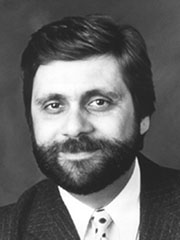Plain Speaking on Health
TC's John Allegrante has written a new textbook for teen-agers
By his own admission, John Allegrante is not "a dispassionate scholar who writes only for my fellow academics." In fact, while Allegrante -- Professor of Health Education -- has indeed written many scholarly and scientific articles, he also is a frequent contributor to the op-ed and letters-to-the-editor columns of mainstream newspapers, as well as to more education-focused publications such as Education Week. A few years ago, wearing his other hat (President and CEO of the
"
All of which explains why Allegrante now has co-authored what he calls "an action text book" on health aimed at teen-agers -- a colorful, down-to-earth volume that covers topics ranging from pregnancy and sexually transmitted infections to making healthy eating choices, using medicines correctly, and expressing anger in healthy ways.
Titled simply Health, the book -- which was written with B. E. Pruitt of Texas A&M University and Deborah Prothrow-Stith of the Harvard School of Public Health -- was published in February by Pearson Prentice Hall, in cooperation with Discovery Education, which produced the "Teens Talk" classroom video series that accompanies the book.
The book offers test prep sections that ask questions like, "What are cluster suicides and what can be done to prevent them?"; offers strategies for refusing an alcoholic drink proffered by peers; features writing assignments in which teens analyze product advertisements that "take advantage of a teen's search for self"; and explains the difference between pathogens and other microorganisms.
Each chapter includes a "Building Health Skills" section that poses hypothetical challenges -- water in school fountains that tastes or smells unpleasant; balancing a family budget in the face of rising health care costs; how to deal with an open fracture -- and a vocabulary review of terms like "pre-adolescent" and "side effects." And there are lists of health agencies and community resources. Students can also go online at a special website for further information and resources.
"This is truly about promoting healthy behavior to young people as a life-long project, using language they best understand and respond to," Allegrante says. "It's new territory for me. I pride myself on writing accessibly, but when I sat down with the editors at Pearson Prentice Hall to go over some of the earliest chapters, my ego was bruised!. They revised almost everything. But, I now see what it was that the editors needed to do to make my writing relevant for the average American adolescent, and I'm really pleased with the result."
WGLT Public Radio
89.1 FM Normal / 103.5 FM Peoria
A 2005 Edward R. Murrow Award winning station
Published Friday, Apr. 7, 2006
